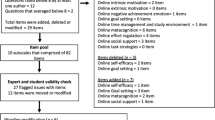Abstract
Purpose
The purpose of this study was to advance learner control as a psychological construct by reexamining its dimensionality and effects on learning and reactions in the context of technology-delivered training.
Design/methodology/approach
Learners (n=384) completed a 2-h web-based Microsoft Excel training. The amount of instructional and scheduling control was manipulated in order to introduce variance in control perceptions. Outcome measures included off-task attention, declarative knowledge, and training reactions.
Findings
Learner control is a multidimensional construct with differential effects on training outcomes. By focusing on learners’ perceptions of control, we found that instructional control perceptions decreased learning by increasing off-task attention, while scheduling control perceptions increased learning.
Implications
Though both dimensions of perceived learner control are positively related to training reactions, they differentially predict learning. Combined with factor analytic evidence, our study suggests that learner control research should differentiate between objective and perceived learner control, and between instructional and scheduling control perceptions. Organizations should consider how learner control affects learning prior to designing training.
Originality/value
Scheduling control is an often used but rarely researched form of learner control. We address this gap by expanding the construct domain of learner control to include scheduling control. Further, this study provides the first empirical examination of learner control perceptions. Despite calls for learner control literature to differentiate between objective and perceived control, no study had previously examined control perceptions directly. Our results may be used to inform organizational decisions regarding the amount and type of control included in training.



Similar content being viewed by others
Notes
Modification indices suggested the potential for correlated errors in the measurement model (e.g., between two items measuring off-task attention). We chose not to include these in the model.
References
Ajzen, I. (1991). The theory of planned behavior. Organizational Behavior and Human Decision Processes, 50, 179–211.
Aly, M. M., Elen, J. J., & Willems, G. G. (2005). Learner-control vs. program-control instructional multimedia: a comparison of two interactions when teaching principles of orthodontic appliances. European Journal of Dental Education, 9(4), 157–163. doi:https://doi.org/10.1111/j.1600-0579.2005.00385.x.
Amazon Web Services (2005–2012). Amazon Mechanical Turk [Computer software]. Seattle, WA.
Behrend, T. S., Sharek, D. J., Meade, A. W., & Wiebe, E. N. (2011). The viability of crowdsourcing for survey research. Behavioral Research Methods, 43(3), 800–813. doi:https://doi.org/10.3758/s13428-011-0081-0.
Behrend, T. S., & Thompson, L. F. (2012). Using animated agents in learner-controlled training: The effects of design control. International Journal of Training and Development, 16(4), 263–283.
Bell, B. S., & Kozlowski, S. W. (2002). Adaptive guidance: Enhancing self-regulation, knowledge, and performance in technology-based training. Personnel Psychology, 55, 267–306. doi:https://doi.org/10.1111/j.1744-6570.2002.tb00111.x.
Bell, B. S., & Kozlowski, S. W. (2008). Active learning: Effects of core training design elements on self-regulatory processes, learning, and adaptability. Journal of Applied Psychology, 93(2), 296–316. doi:https://doi.org/10.1037/0021-9010.93.2.296.
Black, A. E., & Deci, E. L. (2000). The effects of instructors’ autonomy support and students’ autonomous motivation on learning organic chemistry. Science Education, 84(6), 740–756. doi:https://doi.org/10.1002/1098-237X(200011)84:6<740:AID-SCE4>3.0.CO;2-3.
Brown, K. G. (2001). Using computers to deliver training: Which employees learn and why? Personnel Psychology, 54, 271–296. doi:https://doi.org/10.1111/j.1744-6570.2001.tb00093.x.
Brown, K. G. (2005). An examination of the structure and nomological network of trainee reactions: A closer look at “smile sheets”. Journal of Applied Psychology, 90(5), 991–1001. doi:https://doi.org/10.1037/0021-9010.90.5.991.
Buhrmester, M., Kwang, T., & Gosling, S. D. (2011). Amazon’s mechanical turk: A new source of inexpensive, yet high-quality data? Perspectives on Psychological Science, 6(1), 3–5. doi:https://doi.org/10.1177/1745691610393980.
Chou, S., & Liu, C. (2005). Learning effectiveness in a web-based virtual learning environment. A learner control perspective. Journal of Computer Assisted Learning, 21(1), 65–76. doi:https://doi.org/10.1111/j.1365-2729.2005.00114.x.
DeRouin, R. E., Fritzsche, B. A., & Salas, E. (2004). Optimizing e-learning: Research based guidelines for learner-controlled training. Human Resource Management, 43(2–3), 147–162. doi:https://doi.org/10.1002/hrm.20012.
DeRouin, R. E., Fritzsche, B. A., & Salas, E. (2005). E-learning in organizations. Journal of Management, 37(5), 249–265. doi:https://doi.org/10.1177/0149206305279815.
Fisher, S. L., & Ford, J. K. (1998). Differential effects of learner effort and goal orientation on two learning outcomes. Personnel Psychology, 51(2), 397–420. doi:https://doi.org/10.1111/j.1744-6570.1998.tb00731.x.
Fisher, S. L., Wasserman, M. E., & Orvis, K. A. (2010). Trainee reactions to learner control: An important link in the e-learning equation. International Journal of Training and Development, 14(3), 198–208. doi:https://doi.org/10.1111/j.1468-2419.2010.00352.x.
Gilbert, D. T., Pelham, B. W., & Krull, D. S. (1988). On cognitive busyness: When person perceivers meet persons perceived. Journal of Personality and Social Psychology, 54(5), 733–740. doi:https://doi.org/10.1037/0022-3514.54.5.733.
Granger, B. P., & Levine, E. L. (2010). The perplexing role of learner control in e-learning: Will learning and transfer benefit or suffer? International Journal of Training and Development, 14(3), 180–197. doi:https://doi.org/10.1111/j.1468-2419.2010.00351.x.
Gray, S. H. (1987). The effect of sequence control on computer assisted learning. Journal of Computer-Based Instruction, 2, 54–56.
Hanrahan, M. U. (1998). The effect of learning environment factors on students’ motivation and learning. International Journal of Science Education, 20(6), 737–753. doi:https://doi.org/10.1080/0950069980200609.
Hayes, A. F. (2009). Beyond Baron and Kenny: Statistical mediation analysis in the new millennium. Communication Monographs, 76(4), 408–420. doi:https://doi.org/10.1080/03637750903310360.
Kanfer, R., & Ackerman, P. L. (1989). Motivation and cognitive abilities: An integrative/Aptitude-treatment interaction approach to skill acquisition. Journal of Applied Psychology Monograph, 74(4), 657–690. doi:https://doi.org/10.1037/0021-9010.74.4.657.
Kirkpatrick, D. L. (1996). Great ideas revisited. Training & Development, 50(1), 54–59.
Kraiger, K., & Jerden, E. (2007). A meta-analytic investigation of learner control: Old findings and new directions. In S. M. Fiore & E. Salas (Eds.), Toward a science of distributed learning (pp. 65–90). Washington, DC: American Psychological Association. doi:https://doi.org/10.1037/11582-004.
Lang, F. R., & Heckhausen, J. (2001). Perceived control over development and subjective well-being: Differential benefits across adulthood. Journal of Personality and Social Psychology, 81(3), 509–523. doi:https://doi.org/10.1037/0022-3514.81.3.509.
Lawless, K. A., & Brown, S. W. (1997). Multimedia learning environments: Issues of learner control and navigation. Instructional Science, 25(2), 117–131. doi:https://doi.org/10.1023/A:1002919531780.
Long, L. K., DuBois, C. Z., & Faley, R. H. (2008). Online training: The value of capturing trainee reactions. Journal of Workplace Learning, 20(1), 21–37. doi:https://doi.org/10.1108/13665620810843629.
Muraven, M., & Baumeister, R. F. (2000). Self-regulation and deletion of limited resources: Does self-control resemble a muscle? Psychological Bulletin, 126(2), 247–259. doi:https://doi.org/10.1037/0033-2909.126.2.247.
Muraven, M., Tice, D. M., & Baumeister, R. F. (1998). Self-control as a limited resource: Regulatory depletion patterns. Journal of Personality and Social Psychology, 74(3), 774–789. doi:https://doi.org/10.1037/0022-3514.74.3.774.
Noe, R. A. (2010). Employee training and development (5th ed.). Burr Ridge, IL: McGraw-Hill Irwin.
Orvis, K. A., Fisher, S. L., & Wasserman, M. E. (2009). Power to the people: Using learner control to improve trainee reactions and learning in web-based instructional environments. Journal of Applied Psychology, 94(4), 960–971. doi:https://doi.org/10.1037/a0014977.
Paolacci, G., Chandler, J., & Ipeirotis, P. G. (2010). Running experiments on amazon mechanical turk. Judgment and Decision Making, 5(5), 411–419.
Preacher, K. J., & Hayes, A. F. (2008). Asymptotic and resampling strategies for assessing and comparing indirect effects in multiple mediator models. Behavior Research Methods, 40(3), 879–891. doi:https://doi.org/10.3758/BRM.40.3.879
Ryan, R. M., & Deci, E. L. (2000). Self-determational theory and the facilitation of intrinsic motivation, social development, and well-being. American Psychologist, 55(1), 68–78. doi:https://doi.org/10.1037/0003-066X.55.1.68.
Salomon, G., Perkins, D. N., & Globerson, T. (1991). Partners in cognition: Extending human intelligence with intelligent technologies. Educational Researcher, 20(3), 2–9. doi:https://doi.org/10.3102/0013189X020003002.
Scheiter, K., & Gerjets, P. (2007). Learner control in hypermedia environments. Educational Psychology Review, 19, 285–307. doi:https://doi.org/10.1007/s10648-007-9046-3.
Schmidt, A. M., & Ford, J. K. (2003). Learning within a learner control training environment: The interactive effects of goal orientation and metacognitive instruction on learning outcomes. Personnel Psychology, 56, 405–429. doi:https://doi.org/10.1111/j.1744-6570.2003.tb00156.x.
Schwartz, B., Ward, A., Monterosso, J., Lyubomirsky, S., White, K., & Leham, D. R. (2002). Maximizing versus satisficing: Happiness is a matter of choice. Journal of Personality and Social Psychology, 83(5), 1178–1197. doi:https://doi.org/10.1037/0022-3514.83.5.1178.
Sitzmann, T., Bell, B. S., Kraiger, K., & Kanar, A. M. (2009). A multilevel analysis of the effect of prompting self-regulation in technology-delivered instruction. Personnel Psychology, 62(4), 697–734.
Sitzmann, T., Brown, K. G., Casper, W. J., Ely, K., & Zimmerman, R. D. (2008). A review and meta-analysis of the nomological network of trainee reactions. Journal of Applied Psychology, 93(2), 280–2985. doi:https://doi.org/10.1037/0021-9010.93.2.280.
Sitzmann, T., Kraiger, K., Stewart, D., & Wisher, R. (2006). The comparative effectiveness of web-based and classroom instruction: A meta-analysis. Personnel Psychology, 59(3), 623–664.
Skinner, E. A. (1996). A guide to constructs of control. Journal of Personality and Social Psychology, 71(3), 549–570. doi:https://doi.org/10.1037/0022-3514.71.3.549.
Weiner, B. (1985). An attributional theory of achievement motivation and emotion. Psychological Review, 92(4), 548–573. doi:https://doi.org/10.1037/0033-295X.92.4.548.
Welsh, E. T., Wanberg, C. R., Brown, K. G., & Simmering, M. J. (2003). E-learning: Emerging uses, empirical results, and future directions. International Journal of Training and Development, 7(4), 245–258. doi:https://doi.org/10.1046/j.1360-3736.2003.00184.x.
Zhang, D., & Nunamaker, J. F. (2003). Powering e-learning in the new millennium: An overview of e-learning and enabling technology. Information Systems Frontiers, 5(2), 207–218. doi:https://doi.org/10.1023/A:1022609809036.
Acknowledgments
The authors are grateful to Andrew Thal, Benjamin Granger, Caner Bozat, Jaclyn Menendez, Kanjie Diao, and S. Imran Saqib for their assistance with data collection and study design. N. Sharon Hill, Katherine Ely, Adam Kanar, Kyle Emich, Frederick Oswald, and two anonymous reviewers provided insightful feedback and suggestions on previous drafts of this article.
Author information
Authors and Affiliations
Corresponding author
Rights and permissions
About this article
Cite this article
Karim, M.N., Behrend, T.S. Reexamining the Nature of Learner Control: Dimensionality and Effects on Learning and Training Reactions. J Bus Psychol 29, 87–99 (2014). https://doi.org/10.1007/s10869-013-9309-6
Published:
Issue Date:
DOI: https://doi.org/10.1007/s10869-013-9309-6




